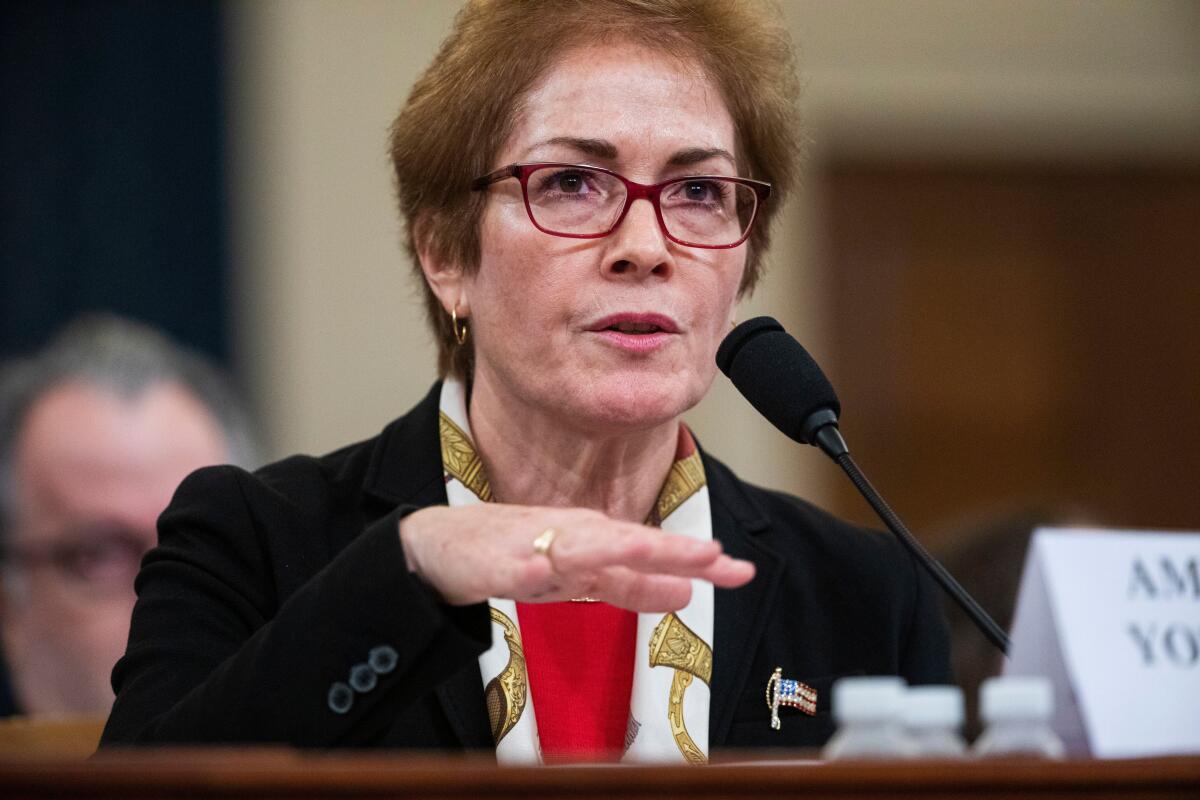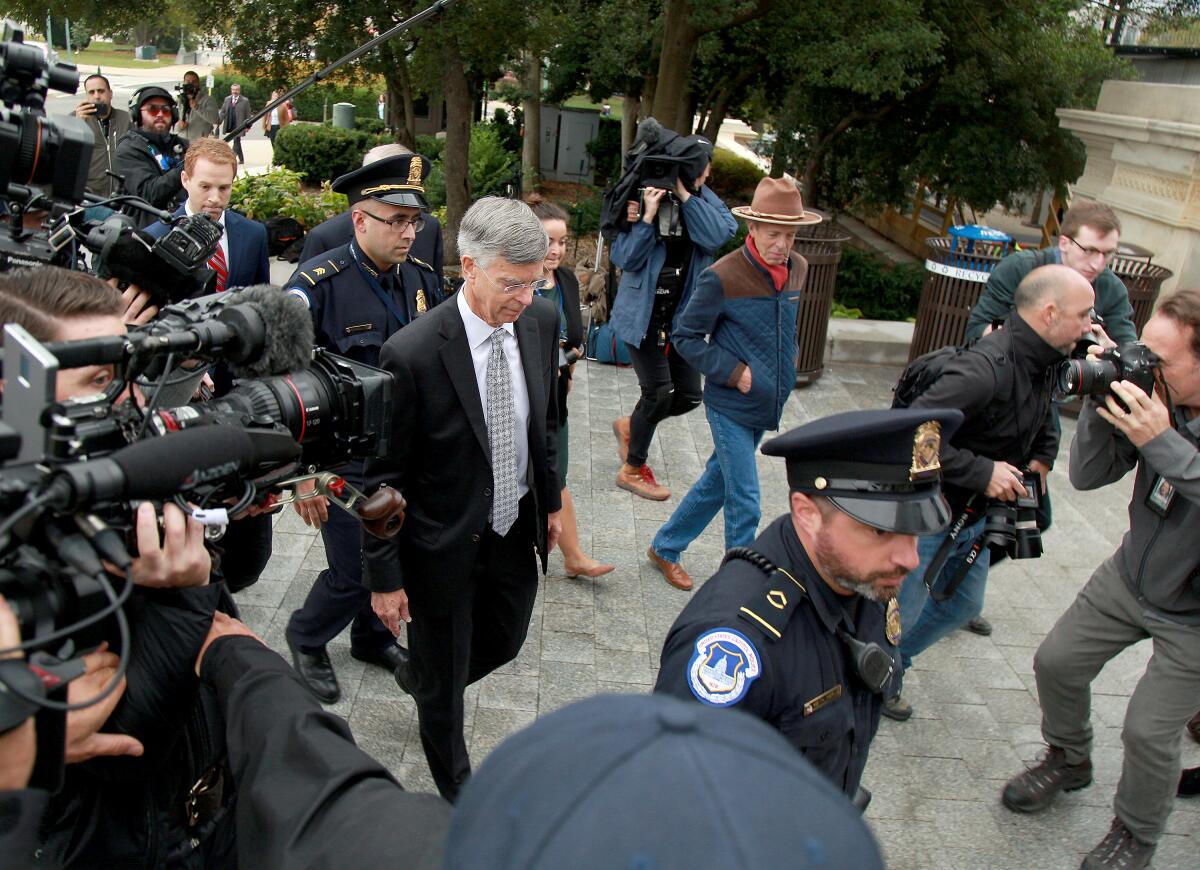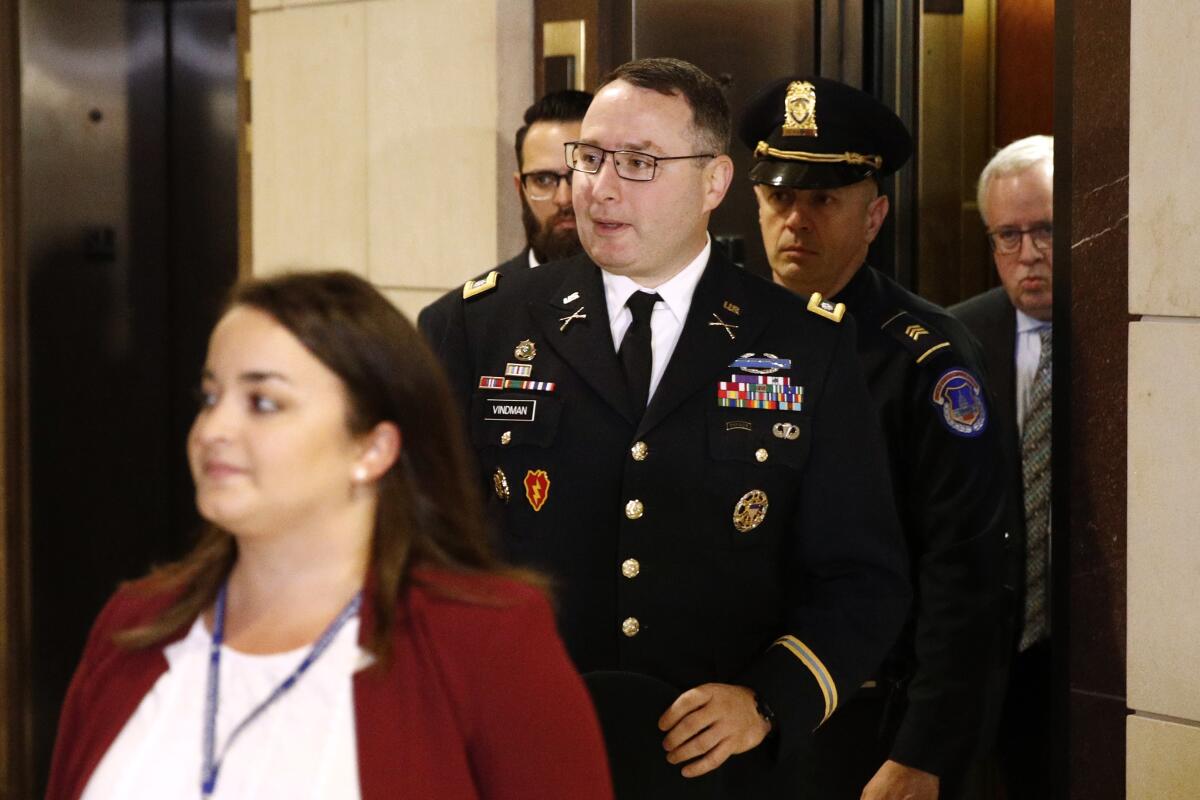In the Trump impeachment hearings, career diplomats are the unlikely stars

- Share via
Marie Yovanovitch would make an ideal character in a mystery novel about a career diplomat who survived intrigue in dangerous capitals only to be undone by a scheming lawyer from New York and a president out to destroy a political enemy at a time when war rumbled along a distant border.
The former Ukrainian ambassador — along with other foreign service officers — have been drawn out of the world of classified communiques and secret dossiers and into the glare of the impeachment hearings against President Trump. Their testimonies have been understated and startling, as if unsung bureaucrats in a John Le Carré story battling an administration seeking favors from Ukraine to benefit Trump politically.
Echoing out on TV and social media, the drama, a cross between the HBO series “Succession” and the novel and film “Advise and Consent,” have offered Americans a glimpse into the lives and calculations of State Department and foreign service officers. The etiquette and precision of diplomacy have collided with conniving politics and a media landscape whose leanings veer from rabid conservatives on Fox News to breathless liberals on MSNBC.
The hearings have put diplomats front and center in a Washington morality tale in a way they haven’t been for decades — and in their own subdued manner they’ve become unlikely heroes in an age of recrimination and skepticism.
Revelations that Trump sought to pressure Ukrainian President Volodymyr Zelensky to investigate Democrats, including Joe Biden and his son, Hunter, have given a portrait of America’s two-track system of diplomacy. One is plied by rich, well-connected donors with little government experience, such as Gordon Sondland, a hotel magnate, who Trump appointed ambassador to the European Union. The other is by career diplomats like Yovanovitch and William Taylor, acting ambassador to the Ukraine, who have shaped U.S. foreign policy for years.

Long second-guessed and belittled by Trump, career foreign service officers were showing themselves to be above partisanship and beholden to the truth. Where Trump is loud and boisterous, they are patient and plodding, men and women who often outlast the leaders they serve.
Hollywood’s image of State Department employees is often depicted in scenes of bureaucrats running through embassy offices and burning documents as helicopters hover and enemies encroach. Or of cocktail parties in distant compounds, where what’s said is calibrated and nuances are as resounding as exclamation points. They tread the line between diplomacy and intelligence gathering, such as Philip Seymour Hoffman’s turn as a CIA operative in “Charlie Wilson’s War” and analysts and counterterrorism officials in Showtime’s “Homeland.”
But reality for many is less dramatic, including for those crunching numbers on the state of Serbia’s economy, deciphering the inner workings of the Kremlin or monitoring tensions between Egypt and other African countries over water rights to the Nile. Predictions by foreign service workers can be on the mark or wildly wrong. But like Yovanovitch, who has moved 13 times and lived in seven countries, they are our eyes and ears on the ground.
Diplomacy is back channels, late-night cables and sometimes foreboding images, such as blindfolded embassy workers during the 1979 Iranian hostage crisis. Graham Greene’s novel “The Quiet American” viewed U.S. foreign policy with contempt, defining it as a perilous mix of naivete and hubris. But diplomats, including the late Richard Holbrooke, who wandered battlefields and helped end the Bosnian war, have been incessant, if flawed, patriots in advancing the nation’s goals.
House Intelligence Committee Chairman Adam Schiff — evoking a Jimmy Stewart earnestness of a Frank Capra movie — told Yovanovitch that he credited “the extraordinary public servants who work all around the world in very dangerous places as you have. I’m glad they’ve (the American people) gotten to see you because you’re often vilified as bureaucrats or diplomacy is diminished as unimportant, anything other than a military doesn’t really matter, when it’s your efforts that often prevent us from going to war.”
Yovanovitch could have been sent from central casting. She sat before the committee last week with hands folded. She wore a scarf, necklace, glasses and dark blazer. She had navigated warlords in Somalia; survived a crossfire in Moscow. She knew the rough ways of the world order. But she looked particularly uncomfortable sitting before Congress and the public. In concise, unadorned language she explained how appalled she was that U.S. interests could be bartered — threats to delay nearly $400 million in military aide to Ukraine — for a president’s political gain.
“Our Ukraine policy has been thrown into disarray and shady interests the world over have learned what little it takes to remove an American ambassador who does not give them what they want,” Yovanovitch testified.
She was scorned on Twitter and Fox News. Trump’s personal lawyer Rudolph Giuliani ridiculed her. She was pilloried by conservative echo chambers as being an operative of a shadowy “deep state” out to destroy the president. Trump called her “bad news” and told Zelensky: “Well, she’s going to go through some things.”
“It sounded like a threat,” testified Yovanovitch, who appeared more perplexed than frightened that after three decades of protecting U.S. interests she had been put in the crosshairs of a volatile president with a limited grasp of and little patience for foreign policy. She stared ahead, confused, hurt. It was a surreal moment that captured a nation of seething parallel realities.

Taylor and Lt. Col. Alexander Vindman, the White House’s top Ukraine expert, who testified this week that “I couldn’t believe what I was hearing” in Trump’s phone conversation with Zelensky, experienced similar backlashes. But even Sondland, Trump’s friend and ultimate political appointee, changed his story on Wednesday and gave stunning testimony, saying the White House wanted a “clear quid pro quo” if Trump agreed to meet Zelensky.
Even before his time before the microphone ended, one could sense movie scripts being written, documentaries being planned, book advances negotiated. It was history, as riveting and perhaps as consequential as when Americans gathered around TV sets in the 1970s to watch the Watergate hearings. A diplomat, even a reluctant one with questions around his veracity, had become an unexpected star in the long-running sordid saga of a reality TV star turned president.
More to Read
The biggest entertainment stories
Get our big stories about Hollywood, film, television, music, arts, culture and more right in your inbox as soon as they publish.
You may occasionally receive promotional content from the Los Angeles Times.











